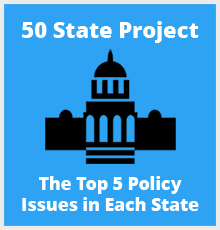
When the 50 State Project was undertaken two years ago by CQ Roll Call, the report producers took an unconventional approach to the project. Instead of surveying public officials and government executives regarding the most talked about issues facing states, they turned to the media to ask about the hottest legislative topics.
The 2016 report marked the second time that budget and tax issues were ranked across the states as the highest-rated concerns on legislators’ priority lists. Education was the most talked about issue among the states in last year’s report, but this year budget and tax issues moved into first place again as the top policy issue. Funding innovations are a top priority in most states and more than half have passed some type of public-private partnership (P3/PPP) legislation. That’s because private capital is now almost always a necessary element of critical public projects.
 While budget, tax and education are all issues of concern in Texas, the number one issue turned out to be immigration and border security. Since the Texas-Mexico border covers 1,250 miles, or more than half of the entire U.S.-Mexico border, that is not surprising.
While budget, tax and education are all issues of concern in Texas, the number one issue turned out to be immigration and border security. Since the Texas-Mexico border covers 1,250 miles, or more than half of the entire U.S.-Mexico border, that is not surprising.
The number two issue in Texas was related to budget issues. Falling oil prices have had a significant negative effect on state revenues. Not only will there be less revenue available, but lawmakers will likely have to find millions of state dollars for Texas’ $40 billion school finance system. The constitutionality of the system has been under scrutiny and has been the subject of lawsuits since the 1980s. Although the Texas Supreme Court ruled the system constitutional recently, there are ongoing concerns and funding is a critical problem for many schools.
In addition to budget, taxes and education, other major issues at the state level in Texas include health care, energy, environmental concerns, transportation, elections, prisons and corrections. On top of these more basic issues, some of the state’s elected leaders have announced that they will ignore federal mandates which could cost the state millions more in revenues.
Issues identified as areas of most concern among other states:
- State-operated mental health facilities in Florida have suffered from increased violence, neglect and lack of beds because of budget and personnel cuts.
- South Carolina has major infrastructure concerns. Record flooding last October led to increased needs and in spite of a recently approved fuel tax increase dedicated to infrastructure, officials say another $1.2 billion in repairs is needed.
- Transportation is a major issue in Oregon, where the last major funding proposal was approved seven years ago.
- In Louisiana, higher education spending by the state has been reduced more than 40 percent since 2008, resulting in unwelcomed tuition hikes for students. Continued state funding cuts have led to the exit of many university professors.
- With the fourth-worse roads in the country, Wisconsin officials are being forced to delay necessary projects because of a lack of funding. Although unpopular, under consideration are increases in both the gas tax and transportation-related fees and the possibility of implementing tolls on some roads.
While the most important issues being debated by legislators may differ, the underlying problems generally are associated with lack of funding. With continued decreases in federal funding, creativity and innovation will be at the forefront of budget discussions in every state. Collaboration with private sector partners may help provide solutions.
